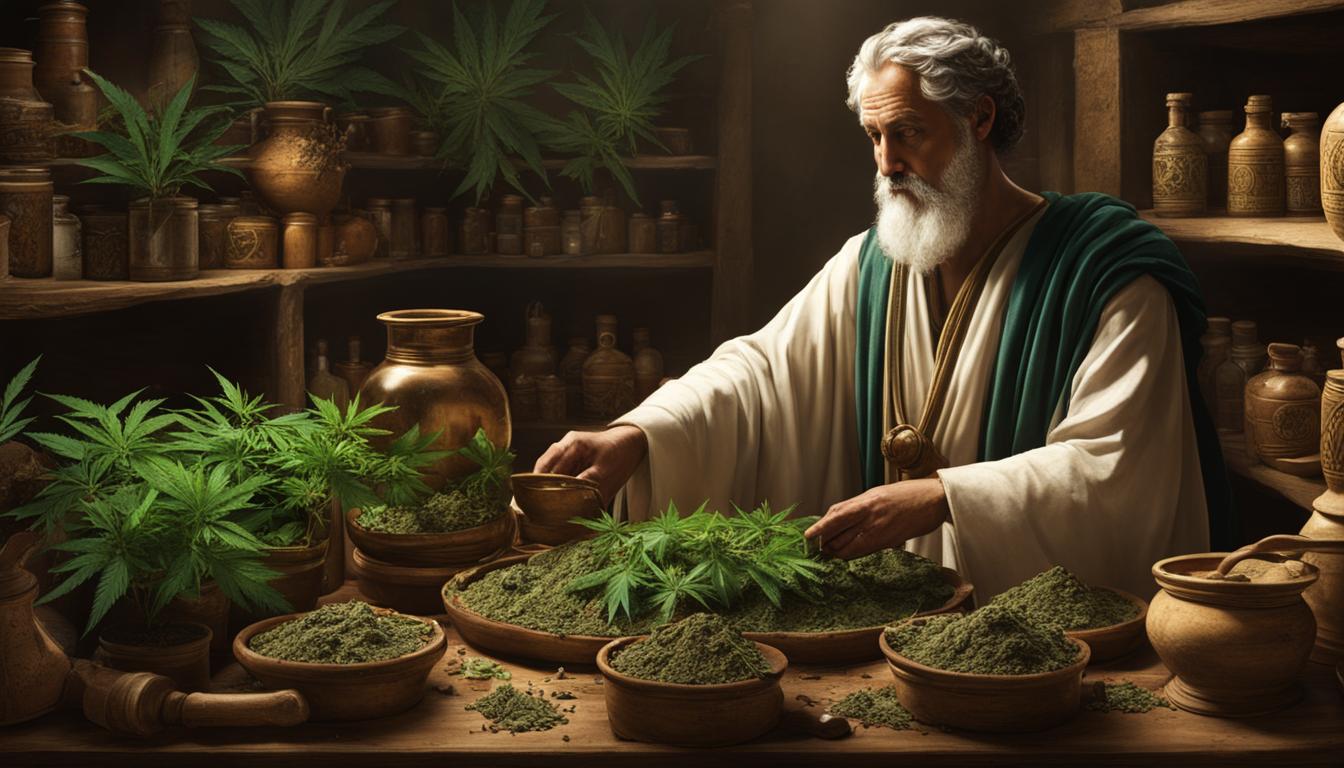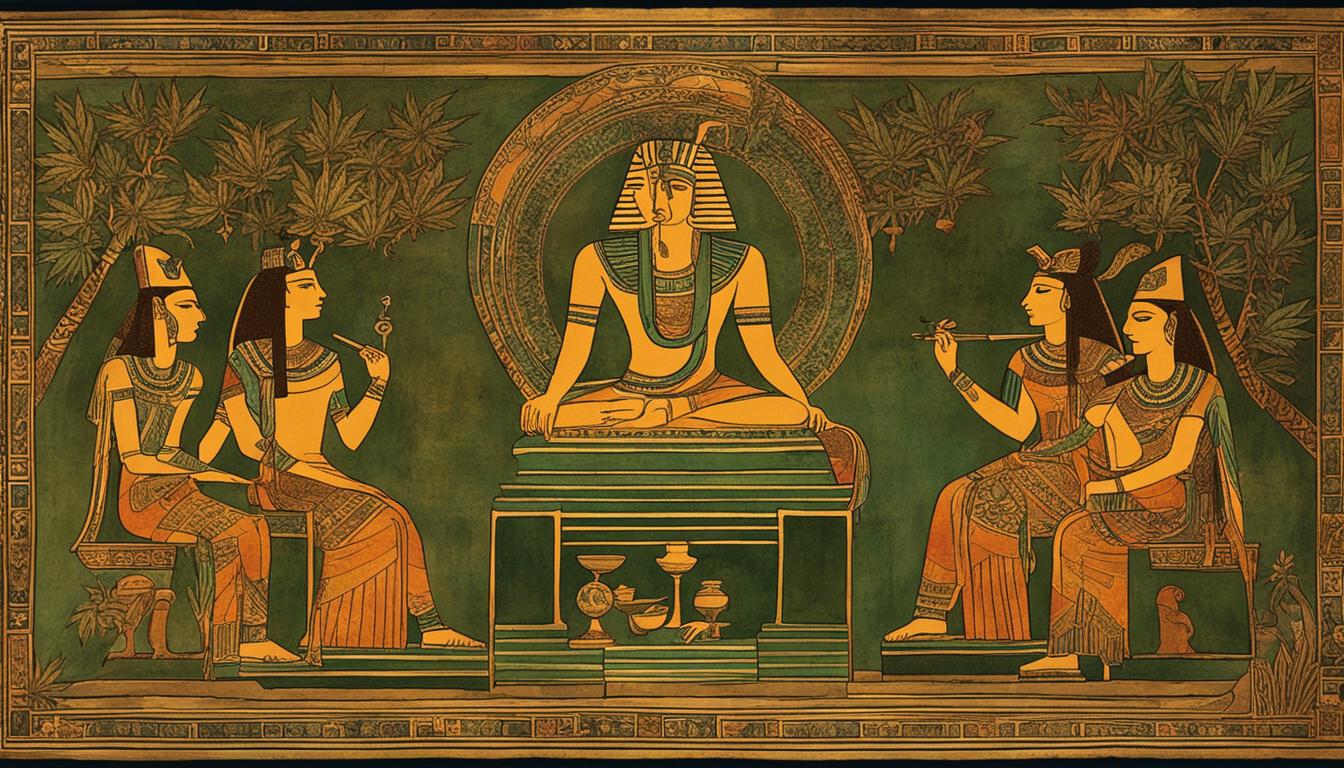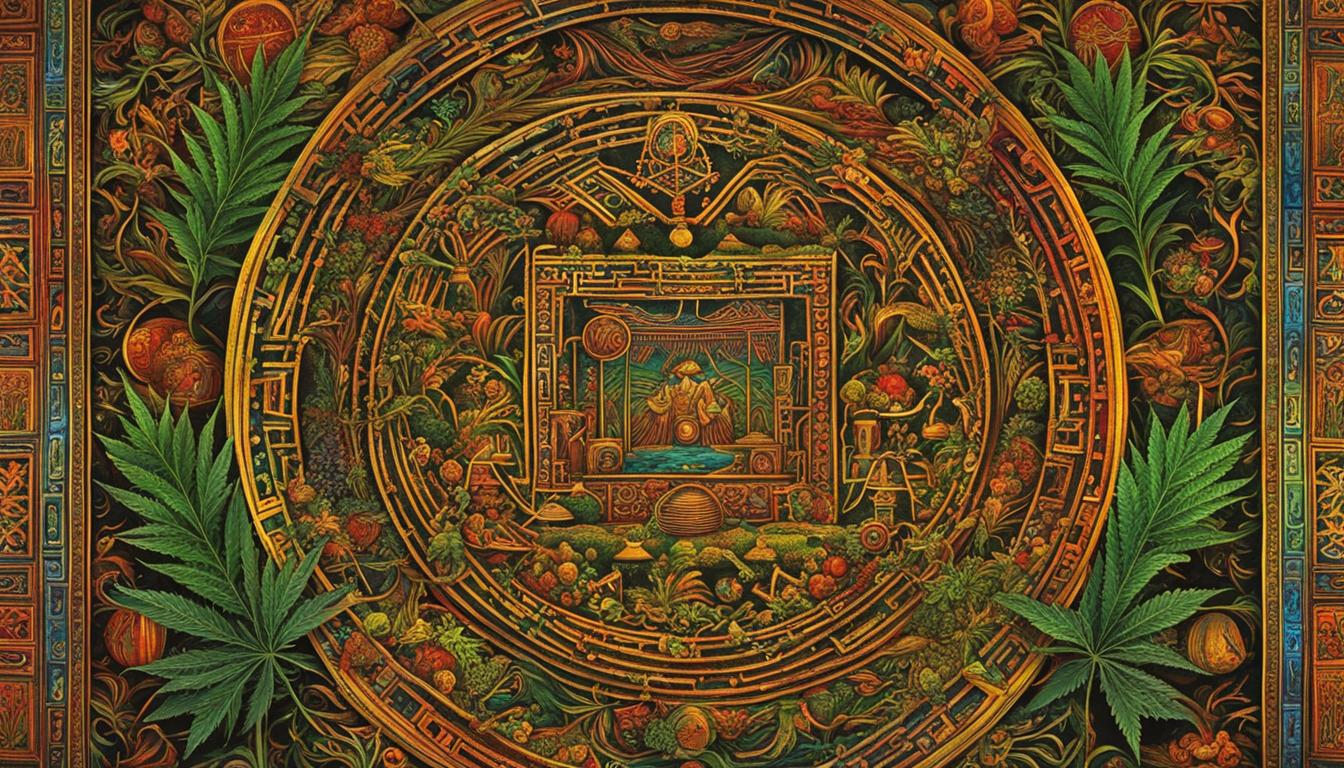Ancient Greek Cannabis Medicine
Discover the fascinating world of cannabis in Ancient Greece and its role in ancient Greek medicine. Journey back in time to a civilization that revered the healing power of plants and explore the rich history of cannabis in ancient Greek society.
As you delve into the depths of ancient Greek medicine, you’ll uncover the profound knowledge that the Greeks possessed about the medicinal properties of cannabis. This sacred plant was not only used for its therapeutic benefits but also played a significant role in their religious and cultural practices.
Unearth ancient texts that mention the use of cannabis to treat inflammation, earaches, and edema. Imagine the skilled Greek physicians of the time harnessing the power of this extraordinary plant to heal ailments both in humans and animals, even dressing wounds and sores on horses.
Step into the world of ancient Greece, where cannabis was revered and cherished for its incredible healing properties. Explore how this remarkable plant was incorporated into remedies and rituals, and how it influenced the beliefs and practices of Athenian society.
Join us on this captivating journey through time as we uncover the ancient wisdom and knowledge of cannabis in ancient Greek medicine. Let the secrets of the past inspire and enlighten you as we delve into the historical significance of cannabis in ancient Greece .
Cannabis as a Remedy in Ancient Greece
In ancient times, cannabis was highly valued in Greek herbal medicine for its numerous healing properties. The ancient Greeks believed that cannabis could be used as a remedy for various ailments, making it an essential part of their medicinal practices. It was commonly used to treat inflammations, melt corns, and even included in medicines against tumors. Additionally, cannabis was used in cataplasms to address inflammations in veterinary medicine.
The use of cannabis in ancient Greek healing practices demonstrates the advanced knowledge and understanding the Greeks had regarding the potential therapeutic benefits of this plant. They recognized the anti-inflammatory properties of cannabis and its ability to soothe and heal various conditions. This highlights the sophisticated nature of ancient Greek medicine and their exploration of natural remedies.
Furthermore, the ancient Greeks believed in the power of moderation in all aspects of life, including medicine. While cannabis was not extensively valued for its psychoactive properties, it was appreciated for its medicinal benefits. The emphasis on moderation in Greek society may have contributed to the limited mention of cannabis’ psychoactive effects in their literature. However, its use in medical treatments and rituals cannot be denied, showcasing the significance of cannabis in ancient Greek culture.
Overall, the historical evidence suggests that cannabis played a crucial role in ancient Greek herbal medicine. The Greeks recognized its potential as a remedy for various ailments, highlighting their advanced understanding of natural healing practices. The use of cannabis in ancient times sheds light on the rich healing traditions of the ancient Greeks and provides valuable insights into their approach to medicine.
Ancient Greek Healing Practices
The healing practices of ancient Greece encompassed a wide range of natural remedies and treatments. These practices were deeply rooted in the belief that the body and mind should be in balance for optimal health. Greek physicians, such as Hippocrates, emphasized the use of herbs, including cannabis, to promote healing and well-being.
“The ancient Greeks had an intricate understanding of the medicinal properties of cannabis and utilized it as a powerful tool in their healing practices.” – Greek Medicine Journal
Through the exploration and utilization of natural substances like cannabis, the ancient Greeks established a holistic approach to medicine that focused on treating the underlying causes of illness rather than just the symptoms. This approach, combined with their extensive knowledge of herbal remedies, laid the foundation for the development of Western medicine as we know it today.
Ancient Greek Cannabis Remedies
| Condition | Treatment |
|---|---|
| Inflammation | Cannabis was used topically or ingested to reduce inflammation in the body. |
| Corns | Applying cannabis-based ointments or poultices helped melt corns, providing relief. |
| Tumors | Cannabis was included in medicines believed to have anti-tumor properties. |
These remedies highlight the diverse applications of cannabis in ancient Greek medicine, showcasing its versatility in treating various conditions. While ancient Greek healing practices may seem unconventional by modern standards, they offer valuable perspectives on the use of natural remedies and the exploration of plant-based medicine.
Cannabis in Ancient Greek Religion
While the ancient Greeks had extensive knowledge of cannabis for medical purposes, there is also evidence to suggest that it played a role in their religious practices. One possible connection is the cult of Asclepius, the god of healing. It is believed that cannabis may have been used as an incense in rituals dedicated to Asclepius, highlighting its association with medicine and healing.
Additionally, the presence of foreign cultures in ancient Greece, such as the Scythians, may have influenced the use of cannabis in religious contexts. The Scythians, known for their nomadic lifestyle and use of psychoactive substances, including cannabis, may have brought their customs and deities to Greece. This cultural exchange could have contributed to the integration of cannabis into religious practices.
While the exact details of how cannabis was used in ancient Greek religious ceremonies remain unclear, it is evident that cannabis occupied a place of significance. Further research and archaeological findings may provide additional insights into the specific religious and ritualistic uses of cannabis in ancient Greece.
“The use of cannabis in ancient Greek religion suggests a connection between healing and spirituality, demonstrating the interconnectedness of medicine, religion, and culture in the ancient world.” – Ancient Greek Medical Historian
Ancient Greek Medical Treatments
Ancient Greek physicians were renowned for their medical knowledge and treatments. They employed a variety of herbs and plants, including cannabis, as part of their therapeutic arsenal. Cannabis was believed to have medicinal properties that could aid in the treatment of various ailments.
While cannabis was primarily utilized for its anti-inflammatory properties, it was also recognized for its potential analgesic and sedative effects. This made it a valuable asset in managing pain and promoting relaxation in patients. Additionally, cannabis was used in the treatment of other conditions such as earaches and edema, showcasing its versatility in ancient Greek medicine.
The use of cannabis in ancient Greek medical treatments demonstrates the holistic approach to healthcare practiced in the ancient world. Physicians recognized the potential benefits of cannabis in alleviating physical discomfort and sought to integrate it into their treatment regimens.
| Ailments Treated with Cannabis | Ancient Greek Medical Treatments |
|---|---|
| Inflammation | Used cannabis for its anti-inflammatory properties to reduce swelling and pain. |
| Earaches | Applied cannabis as a remedy for earaches, possibly through topical applications such as oils or poultices. |
| Edema | Utilized the diuretic properties of cannabis to help reduce excess fluid accumulation in the body. |
 The use of cannabis in ancient Greek medicine reflects the deep understanding of medicinal plants and their potential therapeutic benefits in the ancient world. The integration of cannabis into medical treatments highlights the interconnectedness of nature, health, and spirituality in ancient Greek society.
The use of cannabis in ancient Greek medicine reflects the deep understanding of medicinal plants and their potential therapeutic benefits in the ancient world. The integration of cannabis into medical treatments highlights the interconnectedness of nature, health, and spirituality in ancient Greek society.
Cannabis in Ancient Greek Literature
The ancient Greeks, known for their rich literary tradition, made references to cannabis in their works, providing insights into its cultural significance and potential psychoactive applications. While explicit mentions of cannabis are limited, its presence in Greek literature hints at its role in Athenian society.
A notable example of cannabis being alluded to in Greek literature is in the tragedy “Prometheus Bound” by Aeschylus. In this play, Prometheus, the protagonist, suggests that he possesses the knowledge of plants, including those with medicinal and psychoactive properties:
“I know of every plant that grows, of every herb of power; I am the keeper of the secret of fire.”
This quote implies that the Greeks were aware of the psychoactive properties of certain plants, potentially including cannabis, and recognized their significance in their society.
It is also worth noting that cannabis is mentioned in the works of the Greek poet Theocritus. In his poem “Idylls,” he describes a plant that is believed to be cannabis based on its description of inducing a state of euphoria:
“This drug so secret, which you too must have inhaled before now,
that brings to troubled minds their longed-for peace.”
These literary references suggest that cannabis had a place in Athenian society, potentially as a psychoactive substance used for relaxation and euphoria. While the precise extent of its usage remains uncertain, it is evident that cannabis was not entirely absent from the cultural consciousness of ancient Greece.
Ancient Greek Literature Quotes
| Work | Author | Quote |
|---|---|---|
| Prometheus Bound | Aeschylus | “I know of every plant that grows, of every herb of power; I am the keeper of the secret of fire.” |
| Idylls | Theocritus | “This drug so secret, which you too must have inhaled before now, that brings to troubled minds their longed-for peace.” |
Ancient Greek Remedies: Cannabis as Medicine in Ancient Greece
While the ancient Greeks are renowned for their contributions to philosophy, art, and democracy, their knowledge of medicinal remedies is often overlooked. However, archaeological evidence and ancient texts reveal that the Greeks had a deep understanding of the healing properties of plants, including cannabis. Although cannabis was not widely valued for its psychoactive effects, it played a significant role in ancient Greek medicine.
Ancient Greek remedies often emphasized moderation and natural remedies, aligning with their philosophical belief in balance and harmony. While cannabis may not have been extensively used for its psychoactive properties, it was highly regarded for its medicinal benefits. Greek physicians recognized cannabis as an effective treatment for various ailments, including inflammation, pain, and edema. It was also used in veterinary medicine to treat wounds and sores on horses.
“Cannabis was one of the many potent remedies employed by ancient Greek physicians. Its effectiveness in alleviating inflammation and pain was well-documented.”
To better understand the role of cannabis in ancient Greek medicine, let us explore a comparative table highlighting its use in different remedies:
| Condition | Treatment |
|---|---|
| Inflammation | Cannabis cataplasms |
| Pain relief | Cannabis-infused oils |
| Edema | Cannabis poultices |
As seen in the table above, cannabis was a versatile remedy utilized by ancient Greek physicians. Its application in cataplasms, oils, and poultices highlights the wide range of conditions it was believed to address. While the Greeks valued moderation, they recognized the immediate results that psychoactive plants like cannabis could provide in their medical treatments and rituals.

In the next section, we will explore the historical use of cannabis in ancient Chinese medicine and its significance in their pharmacopeia.
Ancient Chinese Medicine: Unveiling the Uses of Cannabis
When exploring the history of cannabis, it is essential to delve into its significance in ancient Chinese medicine. The Chinese pharmacopeia offers valuable insights into the diverse applications of cannabis in medical treatments during this period. Ancients practitioners utilized cannabis to address a variety of ailments, including inflammation, pain relief, and gastrointestinal disorders. Its versatility made it a valuable tool in the ancient Chinese healer’s repertoire.
Cannabis also played a role in religious and ritual practices in ancient China. Drawn from historical records and ancient texts, the presence of cannabis in these contexts indicates its cultural and spiritual significance. The herb likely held a special place in ceremonies and offerings, further highlighting its importance in ancient Chinese society.
The use of cannabis in ancient Chinese medicine demonstrates the in-depth knowledge and understanding of medicinal herbs in this ancient civilization. Its applications in addressing various ailments and its role in religious practices highlight the significant impact cannabis had on the lives of ancient Chinese individuals. This historical knowledge serves as a testament to the enduring relationship between herbal medicine and human well-being, transcending time and culture.
Ancient Egyptian Medicine and the Medical Uses of Cannabis
Ancient Egypt had a rich tradition of medical practices, and cannabis was an integral part of their medicinal toolkit. One of the primary sources of information on ancient Egyptian medicine is the Ebers Papyrus, a comprehensive medical text dating back to around 1550 BCE. The Ebers Papyrus contains numerous references to the use of cannabis for medicinal purposes, highlighting its importance in ancient Egyptian healthcare.
“Cannabis is mentioned in the Ebers Papyrus as a remedy for inflammation and sore eyes. The text describes a poultice made from ground cannabis seeds mixed with other ingredients that was used to alleviate pain and reduce inflammation. This demonstrates the ancient Egyptians’ understanding of cannabis’ therapeutic properties and their use of it in treating physical ailments.”
Ancient Egyptian physicians were known for their extensive knowledge of herbal medicine, and cannabis played a significant role in their pharmacological practices. The Ebers Papyrus documents various recipes and prescriptions that included cannabis as a key ingredient for treating different conditions, such as gynecological disorders, hemorrhoids, and even as an analgesic.
The use of cannabis in suppositories was prevalent in ancient Egyptian medicine, demonstrating the versatility of this plant in different forms of administration. Cannabis-infused suppositories were used to relieve pain and discomfort, showcasing the ancient Egyptians’ innovative approach to medical treatments.
Overall, the presence of cannabis in ancient Egyptian medicine, as documented in the Ebers Papyrus and other historical sources, reflects its significance as a therapeutic agent in the treatment of various ailments. The ancient Egyptians recognized and utilized the medical potential of cannabis, creating a legacy that has influenced medical practices throughout history.
The Medical Uses of Cannabis in Ancient Egypt
| Medical Condition | Treatment | Method of Administration |
|---|---|---|
| Inflammation | Poultice made from ground cannabis seeds mixed with other ingredients | Topical application |
| Sore Eyes | Poultice made from cannabis seeds | Topical application |
| Gynecological Disorders | Cannabis-infused preparations | Oral administration |
| Hemorrhoids | Cannabis-infused preparations | Oral administration |
| Analgesic | Cannabis-infused suppositories | Rectal administration |
Ancient Indian Medicine: The Medicinal Use of Cannabis in Ancient India
Ancient India, known for its rich tradition of Ayurveda, embraced the medicinal properties of cannabis. The ancient Indians recognized the therapeutic benefits of this plant and incorporated it into their traditional medical practices. Cannabis, referred to as “bhang” in Sanskrit, was utilized to alleviate a range of ailments, including insomnia, headaches, gastrointestinal disorders, and pain relief.
The ancient Indian texts, such as the Sushruta Samhita and the Atharva Veda, provide detailed descriptions of the medical uses of cannabis. These texts outline various formulations and preparations that involved cannabis, highlighting its effectiveness in treating specific conditions. For example, cannabis was often prescribed to promote sleep and relaxation, with the belief that a well-rested body could better heal itself.
“The wise physicians of ancient India sought to harness the healing power of cannabis to restore balance and harmony within the body. They recognized the plant’s ability to alleviate suffering and enhance overall well-being.”
Moreover, cannabis was also used during childbirth to alleviate pain. It was believed to have analgesic properties that could ease the discomfort of labor. This demonstrates the ancient Indians’ holistic approach to medicine, considering both physical and emotional well-being.
The Medicinal Benefits of Cannabis in Ancient India
Ancient Indian medicine regarded cannabis as a valuable tool in achieving optimal health and balance. The plant was known for its analgesic, anti-inflammatory, and sedative properties, making it a versatile remedy for various ailments. Cannabis was often administered in different forms, including as a paste, powder, or decoction, tailored to suit the specific needs of each patient.
| Medicinal Uses of Cannabis in Ancient India | Preparations |
|---|---|
| Insomnia | Consuming a cannabis-based concoction before bedtime |
| Headaches | Applying a cannabis paste to the forehead |
| Gastrointestinal Disorders | Ingesting cannabis-infused oil or decoctions |
| Pain Relief | Applying cannabis oil or poultices to the affected area |
Ancient Indian medicine embraced the holistic approach to healing, emphasizing the importance of maintaining an equilibrium between mind, body, and spirit. Cannabis played a significant role in achieving this balance, offering relief from physical discomfort and promoting overall well-being in ancient India.
Conclusion
The ancient Greeks possessed extensive knowledge of cannabis and its medicinal properties. Evidence suggests that cannabis played a significant role in their medical treatments, religious practices, and daily lives. While the extent of cannabis use in ancient Greece is still debated among scholars, its presence in Greek literature and medical references cannot be ignored.
Ancient Greek cannabis medicine encompassed a wide range of applications. It was used to address inflammation, earaches, and edema in humans, while also proving beneficial in treating wounds and sores in veterinary medicine. Cannabis was treasured for its healing potential and was perceived as a valuable remedy for various ailments.
As we delve into the depths of ancient Greek medicine, we discover an intricate tapestry of herbal remedies. Although the emphasis on moderation in Greek society may have downplayed the psychoactive properties of cannabis, it remains evident that immediate results were highly valued. Thus, psychoactive plants, including cannabis, were incorporated into treatments and rituals, aligning with the ancient Greeks’ pragmatic approach to medicine and magic.
Further research is imperative to fully comprehend the significance and widespread use of cannabis in ancient Greek society. The knowledge and wisdom of the ancients now implore us to explore the depths of Ancient Greek Cannabis Medicine, offering invaluable insights into the past and paving the way for enhanced understanding and appreciation of this ancient healing art.
FAQ
Did the ancient Greeks use cannabis for medical purposes?
Yes, medical references in Greek literature mention the use of cannabis to treat inflammation, earaches, and edema.
How else was cannabis used in ancient Greek medicine?
Cannabis was also used in veterinary medicine to dress wounds and sores on horses.
Was cannabis used in ancient Greek religious practices?
There is evidence suggesting that cannabis had a place in the religious practices of ancient Greece, potentially being used as an incense in the cult of Asclepius, the god of healing.
Were there any references to cannabis in ancient Greek literature?
Yes, references to cannabis can be found in various literary works, including tragedies and poems.
Why is there debate about the extent of cannabis use in ancient Greece?
The prevailing belief among Greek scholars is that cannabis was not extensively used for its psychoactive properties, and the emphasis on moderation in Greek society may have contributed to this perception.
Did other ancient civilizations use cannabis for medical purposes?
Yes, ancient China, Egypt, and India all had knowledge of the medicinal properties of cannabis and used it in their medical treatments.














